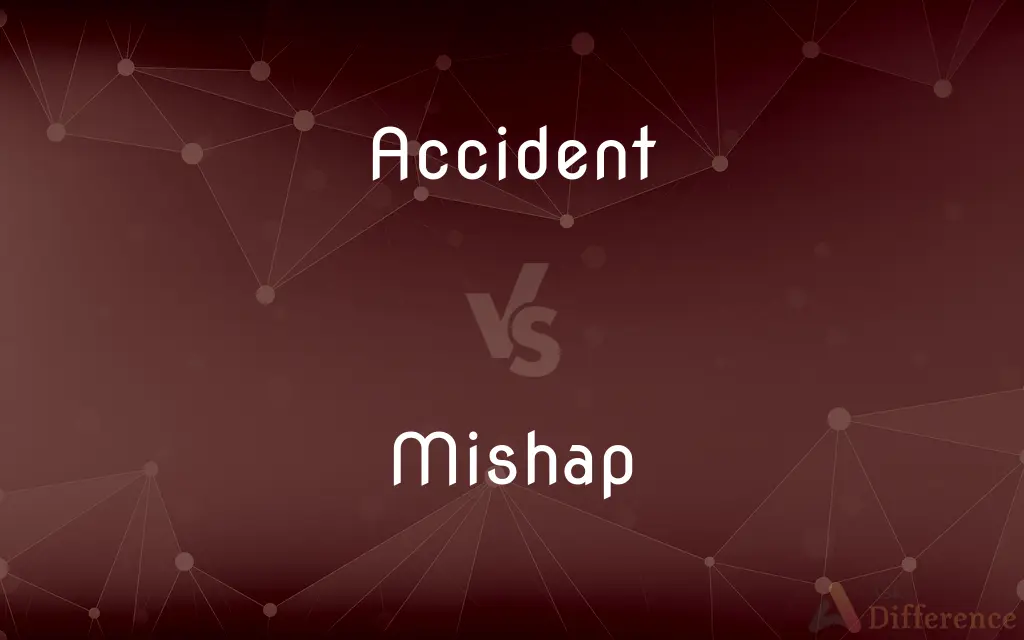Accident vs. Mishap — What's the Difference?
By Urooj Arif & Maham Liaqat — Updated on April 2, 2024
An accident is an unexpected event causing damage or injury, often implying severity, while a mishap is a minor, unlucky incident, suggesting less seriousness.

Difference Between Accident and Mishap
Table of Contents
ADVERTISEMENT
Key Differences
An accident typically refers to an unplanned event that results in harm or damage, such as a car crash or a workplace injury. It often carries a connotation of significant impact, potentially involving legal and financial consequences. A mishap, on the other hand, is used to describe incidents that are also unplanned and unfortunate but are usually of a lesser degree of severity. Mishaps often refer to minor accidents or errors that lead to inconvenience or minor injury, rather than substantial harm or damage.
Both terms emphasize the unintentional aspect of these events, but the key difference lies in the scale and the potential consequences of the incident. While accidents can have far-reaching impacts on health, property, and even legal standings, mishaps are usually contained incidents with limited repercussions.
In discussions or reports, the choice between "accident" and "mishap" can significantly influence the perceived seriousness of the event. For instance, referring to a workplace incident as an "accident" might suggest the need for formal investigations and changes in safety protocols, whereas a "mishap" might be seen as a minor issue that requires simple corrective actions.
Regardless of the term used, both accidents and mishaps highlight the importance of safety, preparedness, and response measures to mitigate the effects of such unplanned events. Understanding the nuances between them can aid in appropriate communication and response strategies following an incident.
Comparison Chart
Definition
An unexpected event causing damage or injury.
A minor, unlucky incident.
ADVERTISEMENT
Connotation
Often serious, with potential for significant impact.
Less serious, usually minor inconvenience or injury.
Examples
Car crashes, workplace injuries.
Spilled coffee, tripping over a rug.
Consequences
May include legal, financial, and health impacts.
Generally limited repercussions.
Intervention
Often requires formal investigation or remediation.
Typically resolved with minimal intervention.
Scale
Can vary widely, but generally more severe.
Usually minor, with limited impact.
Perceived Severity
High
Low
Compare with Definitions
Accident
An unplanned event causing injury or damage.
The factory accident resulted in several injuries.
Mishap
An event causing slight inconvenience or embarrassment.
His trip was full of mishaps, including lost luggage.
Accident
A mishap resulting in significant consequences.
An accident on the highway blocked traffic for hours.
Mishap
An incident of minor injury.
She suffered a small mishap while hiking but was otherwise fine.
Accident
An event occurring by chance or unexpectedly.
It was an accident that he discovered the hidden compartment.
Mishap
A situation resulting from bad luck.
The series of mishaps seemed to follow him all day.
Accident
A situation causing unintended harm.
The chemical spill was an accident that prompted an evacuation.
Mishap
A minor unfortunate incident.
The dinner party was going well until the mishap with the dessert.
Accident
An incident involving liability or legal implications.
The accident led to a lengthy insurance dispute.
Mishap
A small error or mistake.
The mishap in the report was quickly corrected.
Accident
An accident is an unintended, normally unwanted event that was not directly caused by humans. The term accident implies that nobody should be blamed, but the event may have been caused by unrecognized or unaddressed risks.
Mishap
An unfortunate accident.
Accident
An unfortunate incident that happens unexpectedly and unintentionally, typically resulting in damage or injury
If you are unable to work owing to accident or sickness
He had an accident at the factory
Mishap
(Archaic) Bad luck.
Accident
An event that happens by chance or that is without apparent or deliberate cause
The pregnancy was an accident
It is no accident that Manchester has produced more than its fair share of professional comics
Mishap
An accident, mistake, or problem.
Since the mishap with the banana peel, he watches his step.
Accident
(in Aristotelian thought) a property of a thing which is not essential to its nature.
Mishap
Evil accident; ill luck; misfortune; mischance.
Accident
An unexpected and undesirable event, especially one resulting in damage or harm
An accident on the assembly line.
Car accidents on icy roads.
Mishap
(archaic) To happen through misfortune; to mishappen.
Accident
An unforeseen event that is not the result of intention or has no apparent cause
A series of happy accidents led to his promotion.
Mishap
Evil accident; ill luck; misfortune; mischance.
Secure from worldly chances and mishaps.
Accident
An instance of involuntary urination or defecation.
Mishap
To happen unluckily; - used impersonally.
Accident
Lack of intention; chance
Ran into an old friend by accident.
Mishap
An unpredictable outcome that is unfortunate;
If I didn't have bad luck I wouldn't have any luck at all
Accident
(Philosophy) An attribute of a substance that is not essential to its nature.
Mishap
An instance of misfortune
Accident
An unexpected event with negative consequences occurring without the intention of the one suffering the consequences, and (in the strict sense) not directly caused by humans.
To die by an accident such as an act of God
Act of God
Accident
(legal) casus; such unforeseen, extraordinary, extraneous interference as is out of the range of ordinary calculation.
Accident
Any chance event.
Accident
(uncountable) Chance; random chance.
Accident
Any property, fact, or relation that is the result of chance or is nonessential or nonsubstantive.
Beauty is an accident.
Lexical gaps are called accidental because their existence is by accident; it is not essential.
Accident
(grammar) A property attached to a word, but not essential to it, such as gender, number, or case.
Accident
(euphemistic) An instance of incontinence.
Accident
Urine or feces excreted due to incontinence.
Accident
(euphemistic) An unintended pregnancy.
Accident
A person born from an unintended pregnancy.
Taylor was our sweet little accident, and we're so glad!
Well I may be annoying but at least I'm not an accident like you are
Accident
(geology) An irregular surface feature with no apparent cause.
Accident
(geology) A sudden discontinuity of ground such as fault of great thickness, bed or lentil of unstable ground.{{cite book|
Accident
(heraldry) A point or mark which may be retained or omitted in a coat of arms.
Accident
(transportation) Designating any form of transportation involved in an accident.
The NTSB report revealed that the accident airplane was a Cessna 172.
Accident
Literally, a befalling; an event that takes place without one's foresight or expectation; an undesigned, sudden, and unexpected event; chance; contingency; often, an undesigned and unforeseen occurrence of an afflictive or unfortunate character; a casualty; a mishap; as, to die by an accident.
Of moving accidents by flood and field.
Thou cam'st not to thy place by accident:It is the very place God meant for thee.
Accident
A property attached to a word, but not essential to it, as gender, number, case.
Accident
A point or mark which may be retained or omitted in a coat of arms.
Accident
A property or quality of a thing which is not essential to it, as whiteness in paper; an attribute.
Accident
Any accidental property, fact, or relation; an accidental or nonessential; as, beauty is an accident.
This accident, as I call it, of Athens being situated some miles from the sea.
Accident
Unusual appearance or effect.
Accident
Anything that happens by chance without an apparent cause
Common Curiosities
Can the term "mishap" refer to serious incidents?
Typically, "mishap" refers to less serious incidents, though context can sometimes broaden its application.
What is the main difference between an accident and a mishap?
The main difference lies in the severity and potential consequences, with accidents being more serious and mishaps generally minor.
How can understanding the difference between accidents and mishaps help in everyday life?
Recognizing the distinction can help in accurately describing events, setting appropriate responses, and managing expectations regarding consequences.
Are all accidents preventable?
Many accidents can be prevented with appropriate safety measures, though some occur despite precautions.
How should one respond to a mishap?
Responses to mishaps usually involve quick fixes or minor medical care, depending on the incident.
Is an accident always someone's fault?
Not necessarily; accidents can occur due to unforeseen factors, though negligence can sometimes play a role.
Do mishaps involve legal repercussions?
Mishaps usually don't involve legal repercussions unless they escalate or are part of a larger negligence issue.
Can a mishap turn into an accident?
If a mishap leads to more serious consequences or injuries, it might be reclassified as an accident based on its impact.
How are accidents and mishaps treated in the workplace?
Both require reporting and investigation to prevent future occurrences, with more serious accidents potentially leading to formal reviews and changes in safety protocols.
What role does insurance play in accidents and mishaps?
Insurance can provide coverage and compensation for damages or injuries resulting from accidents, while mishaps might not always necessitate claims unless they incur significant costs.
Share Your Discovery

Previous Comparison
Soppy vs. Sappy
Next Comparison
Why vs. BecauseAuthor Spotlight
Written by
Urooj ArifUrooj is a skilled content writer at Ask Difference, known for her exceptional ability to simplify complex topics into engaging and informative content. With a passion for research and a flair for clear, concise writing, she consistently delivers articles that resonate with our diverse audience.
Co-written by
Maham Liaqat















































